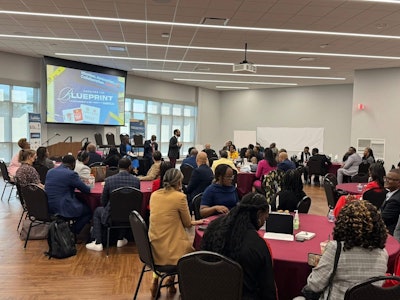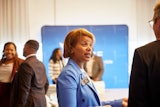 Ed Smith-Lewis, senior vice president for strategic partnerships at the United Negro College Fund facilitates a session at the H.E.L.F convening.
Ed Smith-Lewis, senior vice president for strategic partnerships at the United Negro College Fund facilitates a session at the H.E.L.F convening.
The four-day event, hosted at Claflin's new 80,000-square-foot conference facility, brought together what organizers described as the "best, largest practitioners in the HBCU space" with an ambitious goal of developing a comprehensive blueprint for sustainability and self-agency among HBCUs. The convening represents the culmination of a decade-long commitment to strengthening leadership within the HBCU ecosystem.
Dr. Elfred Anthony Pinkard, one of the co-founders of H.E.L.F, set the stage for the gathering on Wednesday afternoon.
“What might happen if a select group of really smart and committed individuals came together to ideate about the challenges and opportunities facing HBCUs and to develop actionable and very pragmatic solutions and innovations?” he asked, explaining the foundational question that sparked the gathering.
Pinkard, the former president of Wilberforce University who currently serves as an HBCU presidential fellow at Brown University, said that the convening was informed by "two very, very powerful assumptions. One is the power of community, and the other is the power of agency and self-determination." He noted these themes have been consistent throughout African American history, particularly at HBCUs, which he described as "a wonderful visual, tangible evidence of the notion of self-determination and what a people can do when they are focused and rigorous and disciplined."
Dr. Herman J. Felton Jr., H.E.L.F co-founder and president of Wiley University, provided context about the organization's decade-long journey that culminated in this week's summit.
"Some 10 and a half years ago, I attended a conference which I will not name, left there, knowing that I did not have what I thought I needed to give to the presidency," he shared, describing how H.E.L.F began as a response to perceived gaps in leadership preparation for HBCU presidents.
"We thought, yeah, let's just do it. Let's just create something. We don't know what it is that we're trying to do. We're just going to be faithful and put one foot in front of the other. And here we are 10 years later.”
H.E.L.F, he says, is “simply trying to create a space for individuals to really be connected, who have passion, who have desire, and who are serious about strengthening the pipeline for leadership at these institutions."
The diversity of participants—representing various institutions including public and private HBCUs, alongside nonprofit and foundation partners—created what organizers called "collective genius" aimed at addressing both immediate challenges and long-term sustainability. Numerous corporate sponsors, including Sodexo Magic, which sponsored meals throughout the week helped make the convening possible and subsidized attendance costs.
Participants huddled in small groups to begin the work of formulating a plan roadmap that could be shared with all HBCUs.
"We call that document a blueprint,” said Felton. “Why? Because it is the foundation for how we might think about the future of our institutions."
Addressing the urgency of the convening, Felton pointed to the external threats that haunt HBCUs.
"No more important time than now for us to coalesce around a singular idea in that survivability," he said, challenging participants with a provocative question: "Why do we devalue the Black product? He highlighted Virginia Union University’s Center for the Study of HBCUs as just one example of the vibrant research that is already underway.
Echoing Pinkard, he emphasized the importance of self-reliance.
“We are more than enough for ourselves,” he said. “And yet we still walk around looking for ice water that's not poured from our spigot. Why do we do that?"
The format of the gathering emphasized active engagement rather than passive participation. Attendees were encouraged to talk through case studies and were guided by facilitators: Ed Smith-Lewis, senior vice president for Strategic Partnerships at the United Negro College Fund; Dr. M.C. Brown, executive director and research scientist at the Dr. N. Joyce Payne Research Center at the Thurgood Marshall College Fund, and Dr. Dr. Tashia L. Bradley, chief operating officer and vice president for administration at Wiley University.
"This is some serious business," said Felton. "If you think that there are folks who are not planning our demise at this very moment, this is probably not the work, the space or the place for you,”
As the sessions progressed, participants were encouraged to think beyond traditional approaches and consider transformative models for academic delivery, financial sustainability, and student enrollment—all with an eye toward preserving the unique mission and identity of HBCUs while adapting to changing educational landscapes.
Claflin’s president, Dr. Dwaun J. Warmack, pointed to his institution’s phenomenal growth in the six years that he has been at the helm.
“This building right here, there was two houses right here, and folks thought I was crazy when I said we can build this 80,000 square foot facility," he said, adding that the transformation from residential space to a state-of-the-art gathering place parallels the ambitious work of the convening itself—building new possibilities where others might see limitations.
With the blueprint development process now underway, the convening's impact will ultimately be measured by how effectively these collaborative insights translate into practical strategies for sustainability and self-agency across the HBCU ecosystem—a critical outcome in an era of both unprecedented challenges and opportunities for historically Black institutions.
"If there's an opportunity for you to serve, will you? If there's an opportunity for you to lead, will you? And if there's an opportunity for you to follow, will you? Felton asked attendees.
That question resonated with Eboni Bango, a doctoral student in curriculum and instruction at Texas A&M University. She has aspirations of joining the faculty ranks at an HBCU someday.
“It's been an amazing experience,” said Bango, who reflected on her two days at the convening. “I'm so excited to share ideas with everybody, knowing that we all have this deep passion for HBCUs and we're all here committed to excellence for HBCUs and collectively here. Building this group blueprint is something that I'm so excited to be a part of it. “
Dr. DeQuan M. Smith-Murry, an assistant dean of regional campuses at Morehouse School of Medicine, agreed.
“Even beyond brainstorming, there are tangible things that we can take back to start conversations back on our campuses," he added.



















